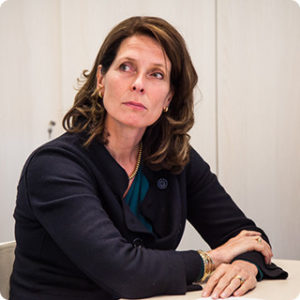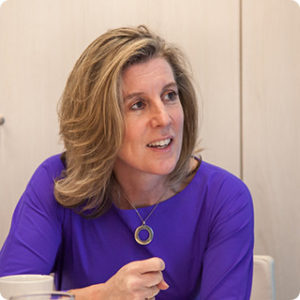Happy workers make happy clients
The British strategy consulting firm Eden McCallum is turning the international consulting world upside down. The firm, founded in 2000, is growing explosively and has already established its place in the top tier of the consulting market. The success factor: a new ground-breaking business model. With, at the core of their proposition, a network of very experienced freelance consultants, tailor-made solutions for clients, and low costs. Alongside their London base, the firm also has an office in Amsterdam (2008) and in Zürich (2015). During the Zwitserleven Pensions Event, Professor Freek Vermeulen from London Business School cited Eden McCallum as a textbook example of business innovation. Reason enough for an interview with Heleen Wachters and Marjon Wanders, founders of Eden McCallum in The Netherlands: ‘Our business model could also be of interest to the financial advisory sector.’
Heleen Wachters and Marjon Wanders, founders of Eden McCallum in The Netherlands. Interviewed by Geert de Vries. Tuesday 23rd June 2015.
Besides a small, compact in-house team, you work exclusively with freelancers. What is the profile of an ideal Eden McCallum consultant?
 Marjon Wanders: ‘The consulting world is broad, with many different types of firms. We mainly look for candidates who have worked at one of the major strategy firms, such as McKinsey, Bain and The Boston Consulting Group. The majority of our talent pool (70%) come from these firms and have worked at least at senior consultant or project manager level. On top of this, 90% of our consultants also have experience in industry. Therefore, alongside their professional knowledge, they also have ‘hands-on experience’. Those ticking all these boxes are our ideal candidates. Incidentally, although we search actively for consultants, we do not recruit them straight from other consultancies. The consultants who work with us leave their consulting firms for a variety of reasons. Often because they want to gain line experience. When they start missing consulting, they come to us – often after only a couple of years.’
Marjon Wanders: ‘The consulting world is broad, with many different types of firms. We mainly look for candidates who have worked at one of the major strategy firms, such as McKinsey, Bain and The Boston Consulting Group. The majority of our talent pool (70%) come from these firms and have worked at least at senior consultant or project manager level. On top of this, 90% of our consultants also have experience in industry. Therefore, alongside their professional knowledge, they also have ‘hands-on experience’. Those ticking all these boxes are our ideal candidates. Incidentally, although we search actively for consultants, we do not recruit them straight from other consultancies. The consultants who work with us leave their consulting firms for a variety of reasons. Often because they want to gain line experience. When they start missing consulting, they come to us – often after only a couple of years.’
 Heleen Wachters adds: ‘In terms of personality type, it is important that our consultants are comfortable with the financial instability of a freelance existence. We do not guarantee work and income. You need to be able to live with this. The positive flip-side is the flexibility and choice to organise your work and life as you wish. Each consultant can give us his or her preferences in terms of types of project, when they want to work and for how long, whether they want to work in large or small teams, whether or not they want to travel and so on. When we put together a team for a project, we look at their individual wishes; we explicitly take these into account. Consultants can then say ‘yes’ or ‘no’. This model is not only very attractive for women who want to combine family life with working at the highest level. There are also more and more men who wish to take a break, to write a book, to renovate a house, to teach at a university or to get a PhD. Many of our consultants have interests alongside their work. The can easily combine this with working with us.’
Heleen Wachters adds: ‘In terms of personality type, it is important that our consultants are comfortable with the financial instability of a freelance existence. We do not guarantee work and income. You need to be able to live with this. The positive flip-side is the flexibility and choice to organise your work and life as you wish. Each consultant can give us his or her preferences in terms of types of project, when they want to work and for how long, whether they want to work in large or small teams, whether or not they want to travel and so on. When we put together a team for a project, we look at their individual wishes; we explicitly take these into account. Consultants can then say ‘yes’ or ‘no’. This model is not only very attractive for women who want to combine family life with working at the highest level. There are also more and more men who wish to take a break, to write a book, to renovate a house, to teach at a university or to get a PhD. Many of our consultants have interests alongside their work. The can easily combine this with working with us.’
So, freedom and happiness. How then do you achieve a bond and a sense of Eden McCallum spirit?
Heleen: ‘We recognise that it is essential that consultants continue to develop. This is not only essential for their long term employability, but also for the continuity of Eden McCallum’s business model. After all, we succeed or fail on the back of the quality and expertise of our consultants. In order to ensure that they keep learning, we regularly organise special activities, such as network events, knowledge sharing meetings, presentations by experts and panel discussions on current consulting topics. At the moment, we mainly do this in London, where Eden McCallum has been active longer. But we certainly have the ambition to also introduce these in The Netherlands. And later also in Switzerland.’

